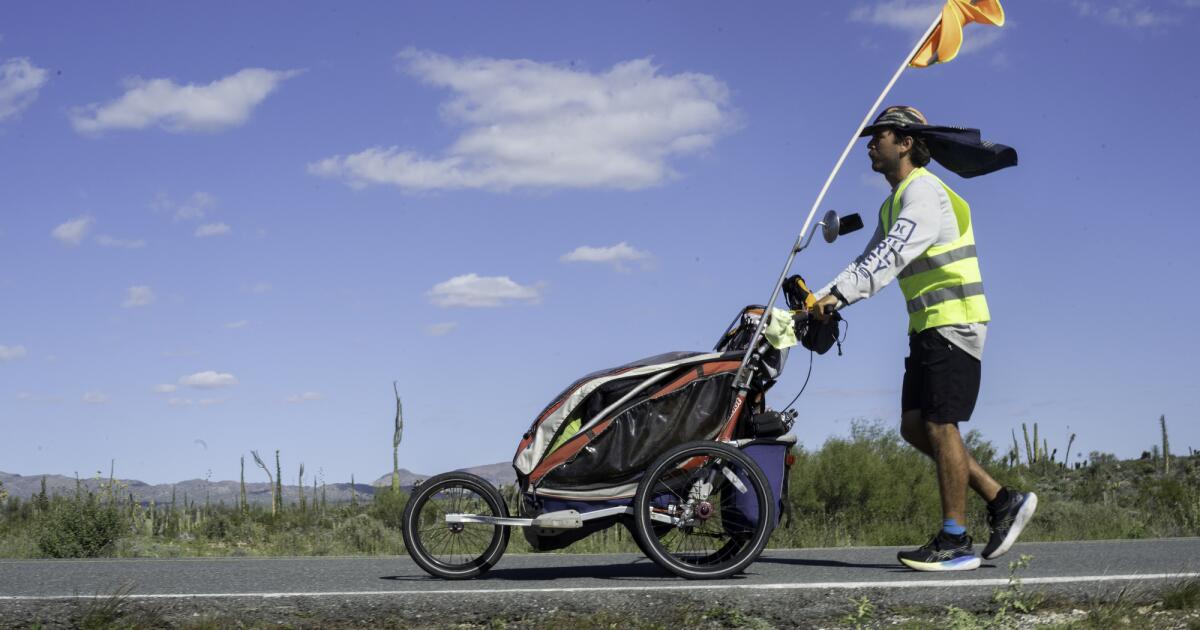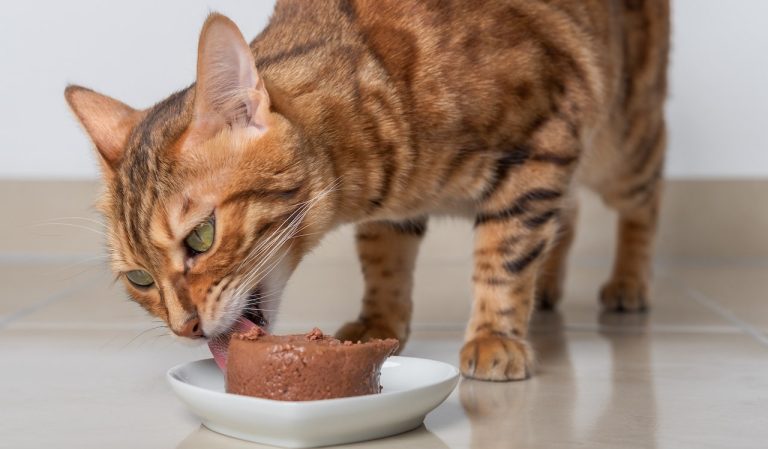
Dark clouds loomed in the distance Sunday as a jovial Esteban Quiñones Gutierrez walked along Federal Highway 1 from Rosarito to Playas Tijuana, where he would complete his 77-day long trek walking the entire length of the Baja California Peninsula. That’s around 1,056 miles – or about the distance from San Diego to Washington State.
A brisk stride soon turned into a sprint to an overpass as rain doused him just before noon. Without hesitation he dug through his cart to change pants and switch into rain gear to continue the last leg. The minor delay was nothing for him, after nearly three months of traveling experience withstanding various elements.

Quinones walks through the desert along Federal Highway 1 outside of Crucero, Baja California on Thursday, Feb. 29, 2024.
(Ana Ramirez/The San Diego Union-Tribune)
Quiñones, a photographer, said he wanted to grow as an artist – mentally, physically and spiritually. He decided an immense hike was the way to do it.
“The first day was hard. I walked 36 kilometers, and I was really tired. … I was like why, why am I here? What am I doing?” the 29-year-old wondered.
He said he learned how powerful the mind can be.
“Sometimes the body wants to make you fail and the brain is more important. You need to take control of your body with the patient mind.”
Quiñones, more known by his followers as Esteban Gitano, which means gypsy in Spanish, began his expedition in Cabos San Lucas on Jan. 8. He pushed a cart outfitted with an orange flag for safety and stuffed with all his belongings.
Documenting his progress online with Instagram stories and images from his Fujifilm X100T camera, he gathered quite a following. Honks, shouts and waves from passersby continued throughout the journey. His usual response included “peregrino,” a nickname he has given his followers that can mean traveler, after his mother said “buen camino, peregrino” (which roughly translates to safe journey, traveler) to him as he left home.
Some followers stopped to offer him water or to ask for a selfie. A mother and son from Rosarito said they had been following him for the past two months. Quiñones asked their names as he pulled out a leather case containing postcards of his photography. He wrote a personal message on one and gave it to them.

A group follows Quinones on Federal Highway 1 toward Tijuana on Sunday, March 24, 2024, in Rosarito.
(Ana Ramirez/The San Diego Union-Tribune)
An hour later Claudio Pasillas stood waiting along the road, cellphone out, recording, with a giant smile. He greeted the adventurer with a handshake and hug.
Pasillas said he had been following Quiñones since the beginning.
“He seems to me to be a person who transmits good vibes and did something to admire,” Pasillas said in Spanish. “Sometimes we have in mind to carry out some activity or actions, and we don’t do them because we leave everything for tomorrow.”
On average, Quiñones would traverse 21 to 27 miles per day depending on the next town – sometimes camping in the desert or along the shore, but mostly sleeping in restaurants. The winter months were mild and mostly enjoyable with some windy days.

Quinones walks from Rosarito to Playas Tijuana on Sunday, March 24, 2024.
(Ana Ramirez/The San Diego Union-Tribune)
He said what surprised him the most was the kindness of others. People would offer him a place to stay, give him food, a cold Coca-Cola or beer, or even money.
One person gave him a lift after his pushcart broke down outside Ensenada. He found the part he needed at a store and then backtracked to where the cart had stopped.
Taking a break Sunday he pulled out tostada shells, a jar of mayo, hot sauce and two packages of tuna, making a comment of wanting the brand to sponsor him. He showed off a few blisters and calluses while changing his rain-soaked socks.
Back on the road, he took live cellphone video to update his location for his Instagram followers.
Frequently checking his side mirror for approaching vehicles, he talked about how his family wasn’t supportive in the beginning and didn’t understand his need for adventure and travel. But later he expressed excitement for seeing them soon and going home to Durango, Mexico, to eat barbecue and his mother’s lasagna.

Quinones uses a rearview mirror to check traffic while finishing walking about the distance from San Diego to Washington State.
(Ana Ramirez/The San Diego Union-Tribune)
About five miles toward the end of the trek his expression changed, becoming solemn and determined. The pace quickened as he approached the border of Tijuana.
“I’m going to cry once I get there,” he said. “To complete this project for me, it’s going to be a lot. I know it’s going to be a lot of euphoria and a lot of strong feelings in my last steps.”
A gust of wind blew off his red hat that read Baja California. He switched to sunglasses. While he trudged along a steep hill, dogs ran back and forth barking. Moments later, around the bend, he heard screaming and cheering. It was his family. His mother and sisters jumped up and down as his father filmed.
One of his sisters hugged him for what seemed like minutes. The family carried on along the highway. His mother led and grinned while pushing the cart. Eventually his mother and one of his sisters took an Uber to meet the rest of the family later. The remaining family members continued walking.

Liliana Gutierrez Fragoso hugs her son on Sunday, March 24, 2024 in Rosarito.
(Ana Ramirez/The San Diego Union-Tribune)
A follower joined the family for a few blocks as they entered Tijuana.
Approaching the end of the long journey, at the U.S.-Mexico border, more than 20 people waited, clapping and cheering, including Pasillas and the rest of his family. Quiñones’ face scrunched, and tears filled his eyes. He covered his face before gathering his thoughts and making a few remarks to the crowd. He approached the border, placed both hands on the steel fence and cried.

Quinones cries when he reaches his destination at the U.S.-Mexico border wall on Sunday, March 24, 2024 in Playas Tijuana, Baja California. “The adventure made sense. Everything made sense in the end,” Quinones said about his journey coming to an end. “My family was supporting me and people that follow my project were supporting me. … All my dreams now are coming true.”
(Ana Ramirez/The San Diego Union-Tribune)
“I want (people) to know that there is something inside of each other, a really strong power that can lead us to anywhere we want to go,” he said.
“I want to be an example of that, and that hopefully people can see themselves in me and can know that they can do anything they want just by knowing themselves.”






